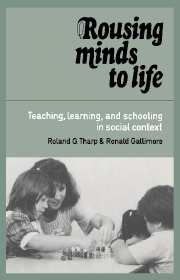Book contents
- Frontmatter
- Contents
- Acknowledgments
- Introduction
- Part I Teaching, schooling, and literacy: a unified theory of education
- Part II Practice
- 6 A school organized for teaching: the Kamehameha Elementary Education Program
- 7 The activity setting of the instructional conversation: developing word and discourse meaning
- 8 The orchestration of activity settings: learning and social interaction in the whole group and independent centers
- 9 The interpsychological plane of teacher training
- 10 Assisting teacher performance through the ZPD: a case study
- 11 The intrapsychological plane of teacher training: the internalization of higher-order teaching skills
- 12 The schools in mind and society
- References
- Author index
- Subject index
12 - The schools in mind and society
Published online by Cambridge University Press: 05 June 2012
- Frontmatter
- Contents
- Acknowledgments
- Introduction
- Part I Teaching, schooling, and literacy: a unified theory of education
- Part II Practice
- 6 A school organized for teaching: the Kamehameha Elementary Education Program
- 7 The activity setting of the instructional conversation: developing word and discourse meaning
- 8 The orchestration of activity settings: learning and social interaction in the whole group and independent centers
- 9 The interpsychological plane of teacher training
- 10 Assisting teacher performance through the ZPD: a case study
- 11 The intrapsychological plane of teacher training: the internalization of higher-order teaching skills
- 12 The schools in mind and society
- References
- Author index
- Subject index
Summary
The meaning of the word “school”
Word meaning is acquired through the talk that accompanies joint productive activity. As people work together and use the same words to refer to their acts and experiences, they come to share the same lexicon, and they internalize the same meanings of those words. School is the one obligatory activity setting that is shared by all of our society. It is set in the formative years and lasts more than a decade; for many, it is the primary activity setting of youth and young adulthood. Because schools are so much the same, everywhere, and because they have been so much the same for so many generations, the word “school” has as deep, as shared, and as intractable a meaning as any other word in our language. In a century of bewildering changes, when grandparents and grandchildren seem born to different planets, there is one word and concept that is shared across the generations. All citizens know what “school” means.
When citizens and their leaders hear of places and things calling themselves “schools” and those places and things do not correspond to the nation's internalized and shared vision, a deep offense is experienced, an offense to all the components of basic meaning – the intellectual, emotional, activity, and historical components of the meaning of the word “school.” The tendency of society is to gather back to the flock any errant geese.
- Type
- Chapter
- Information
- Rousing Minds to LifeTeaching, Learning, and Schooling in Social Context, pp. 266 - 279Publisher: Cambridge University PressPrint publication year: 1989



